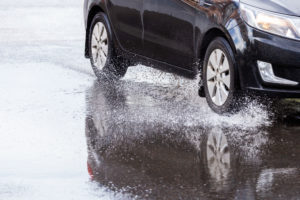How Can Tampa Weather Cause an Accident?
Though it is not the same as regions that get icy conditions, the weather in Tampa can cause significant challenges for drivers from extreme heat to slick roads. We might not stop to think about a hot, sunny day leading to an accident. After all, this is ‘The Sunshine State.’ But, you may be surprised at how easily an accident can occur, rain or shine.
Florida Heat and Your Tires
Your tires are the only contact point your vehicle has with the road. If your tires are in poor condition, it can increase the likelihood of having an auto accident. This is especially true in places with extreme heat, like Florida.

The NHTSA estimates that tire failure causes approximately 11,000 auto accidents per year. To help reduce your chances of enduring an auto accident resulting from tire malfunctions, it’s essential to know how Tampa weather affects them. Three Florida summer weather factors can dramatically change your tires’ efficiency: heat, humidity, and rain.
Even though tire manufacturers strive to make the rubber resistant to heat, it’s impossible to make them impervious to heat. In Florida, the heat index can easily reach 110 degrees in the summer. Because asphalt is dark, it absorbs the heat and often temperatures that can exceed 160 degrees.
As the temperature rises on the asphalt, your tires begin to expand. For every 10 degrees increase in the temperature, the pressure in your tires rises one PSI. This may not sound like much. But, if the manufacturer calls for 30-35 PSI in your tires at 70 degrees, when it rises to 110 outside and 160 on the asphalt, your tire PSI could be nearing 45 PSI.
Even if the tire doesn’t blow out under the increased pressure, it is doing more damage to the tire by causing uneven wear and tear. Additionally, the points of contact with the road are decreased as it inflates, which can interfere with your ability to brake properly.
To help make sure you don’t fall into the statistics of auto accidents caused by tire blowouts, be sure to keep an eye on your tire pressure. Check it manually and check it often, especially if the temperature is beginning to rise outside. Also, be sure to perform routine maintenance checks on your tires to keep them performing at their best for longer.
How Do I Avoid Accidents in the Tampa Rain?
During the summer months, the wild changes in Tampa weather that bring about the summer storms can wreak havoc on your tires. While the drop in temperature and rain is often a welcome reprieve from a scorching day, it could spell disaster if you’re driving unprepared.
When it rains, the puddles that form on the roadways cause your tires to lose traction with the asphalt. When this happens, you can completely lose control of the vehicle as your tires lose contact with the road. This is known as ‘hydroplaning,’ and it is one of the biggest causes of auto accidents in Florida.
If you find yourself in a skid, it is crucial to know how to respond quickly. Stay calm, maintain your grip, and do not turn the wheel. Try to keep your vehicle pointed straight ahead. Slowly remove your foot from the gas pedal so the car slows down, giving you time for your steering to return to normal.
If you need to brake, use light pumping actions and avoid stepping hard on the brake pedal to keep your brakes from locking up. Most modern vehicles are equipped with anti-lock brakes (ABS), which mimic the pumping action automatically.
When it’s time to choose the right tires for your vehicle that can handle Florida rainstorms, look for these tire features as they can either contribute to or help you avoid hydroplaning:
- Tire size and width – Wider tires provide more contact points with the road.
- Tire tread pattern – Long, narrow, tread patterns help channel water away from the tire more effectively, providing more contact points.
- Tire tread depth – The depth of your tire tread plays a crucial role in your tire’s performance. A good rule of thumb to check tire tread depth is to use a penny to measure it. Place the penny in between several different areas of the tread and if you can see the top of Lincoln’s head, it is time to replace your tires.
- Tire pressure – Always use a manual tire pressure gauge to check tire pressure and keep it at the manufacturer’s recommended PSI. If the weather changes suddenly, do a quick check to make sure your tires aren’t over- or underinflated.
What Other Driving Risks are Associated with Florida Weather?
It’s important to note that the rain can present more dangers on the roadway than just hydroplaning. According to the US Department of Transportation, auto accidents caused by rain and wet pavement make up the vast majority of the causes of weather-related accidents. Together, they also make up around 20% of accident-related fatalities.
Reduced visibility due to strong rain and fog, high winds, submerged lanes, and lane obstruction are all dangers to be aware of when the rain starts to come down. It may take you a little longer to reach your destination, but please slow down, keep your eyes open for hazards, and know what to do if you are involved in an auto accident.
At the Law Offices of Darrigo & Diaz, our injury lawyers in Tampa want to provide you with the best information possible to help you avoid auto accidents. So, be careful driving in this hot and rainy weather and make sure your tires are in good condition to maintain optimal performance. If the unthinkable happens and you have been injured in an accident, please call our office for a free consultation at (813) 774-3341.
